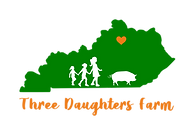
Handled with Extreme Care
Our standards in raising happy, healthy animals.
It is our absolute priority to treat our animals humanly. We care deeply about the animals we raise and their well-being from the moment they were born and have implemented practices that embody our beliefs. All Three Daughters Farm's pasture pork and lamb products are raised to these standards, so you can feel good about enjoying every delicious bites.
-
No gestation crates. Pasture farrowing allows sows to express natural behaviors like nest-building and provides fresh air and sunlight, which support overall health. The open environment reduces disease pressure, strengthens piglet immunity through exposure to soil, and promotes better manure distribution, naturally fertilizing the land. With more space to move, sows experience lower stress, leading to improved maternal care and strong, thriving litters.
-
Every animals are raised in pasture from the moment they were born. No one is house indoor or "cooped up" in a barn on a concrete floor. 24 hours a day, 7 days a week, 52 weeks a year, every animals have access to fresh pasture and grass. In the winter time, they are supplemented with locally grown hay.
-
Plenty of shades and wallows to battle the Kentucky heat! Our pigs also enjoy large wallows which helps cooling them down on hot summer days.
-
No shortcuts. We believe that hard work and providing the best possibly care to every animals every single day is the only way to sustainably raise and provide premium quality meat.
-
No added hormones. No vaccination. No unnecessary antibiotics. Ever.
What is BioDynamic?
Biodynamic is a holistic, ecological and ethnical approach to farming, gardening, food and nutrition. We view our farm as an integrated, whole, living organism that is made up of many interdependent elements: fields, forest, plants, animals, soils, compost and people. We work hard to nurture and harmonize all elements in a holistic and dynamic way to support the health and vitality of the whole. We listen to the land and encourage natural ecosystem. We bring together our in-house garden with our livestocks to bring plants, animals, and soils together.
We treat our animals with respect. It's that simple.
We care for our animals in ways that support their health and the full expression of their nature. Animals are fed feed that is appropriate for their digestive system with sufficient minerals and are never fed any animal bi-products. Lambs and piglets are raised on their mother's milk and never on milk replacer. Tails are not docked, teeth are not clipped, and we do not de-tusk as each part of the animal serves an important natural function. All animals have access to the outdoor pasture and free range forage, along with plenty of space to move around.

Pests and Disease Management
We focus on creating conditions that promote optimal soil, plant, and animal health, providing balanced nutrition and supporting healthy immunity. We find that when diversity is employed, pests and diseases have few places to thrive. When one does present itself, it is often pointing to an imbalance in the farm organism and can be seen as the nature way o trying to correct the imbalance. While we do utilize synthetic wormers as part of our routine preventative health practice for our herd, we also focus heavily on finding the underlying imbalance and find ways to adjust our management practices to bring our farm to greater health.
What we do
Multi-species rotational grazing and pasture management
Manure management through composting
Added mineral in animal feed
Weaning piglets and lamb at 42 days (The age at which young animals are weaned is an important factor in regard to parasite resistance.) or allow mamas to self-wean.
Biosecurity procedures for all incoming livestock. All new livestock are quarantined for a minimum of 30 days before being introduced to the rest of the animals, regardless of species. Our team attend the duties in the isolation paddocks last to ensure nothing is returned to the remaining herd afterward.
.png)

